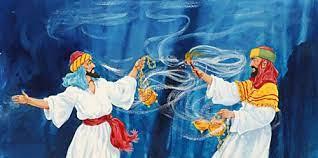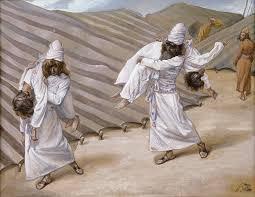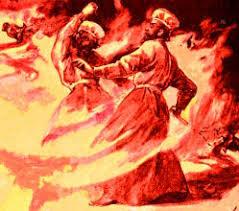The Death of Nadab and Abihu
10: 1-11
The death of Nadab and Abihu DIG: What was the sin of Nadab and Abihu? What hint do we have about the cause of their death? How did Nadab and Abihu vividly demonstrate the principle of the sacrificial system? What was the result of two dead bodies laying in the Tabernacle courtyard? What are the sobering implications for the Church today?
REFLECT: Do you relate to God more as ADONAI, your Buddy, or as Ha’Shem, your Holy God? Does YHVH seem dangerous to you? The Israelites had to personally kill their sacrifice before it was offered as a substitute. Their atonement was up close and personal. What keeps you focused on the personal sacrifice that Messiah made on the cross for you?
The death of Nadab and Abihu revealed the holiness of God before the Israelites.
Nadab and Abihu were not shamans or snake-oil salesmen who infiltrated the camp of Isra’el in order to spread the Canaanites’ superstitions among the people. They were by all appearances righteous, respectable men and godly spiritual leaders. They were priests of the one true God. And they were no middling Levites. Nadab was heir apparent to the office of high priest, and Abihu was next in line after him. These two brothers, together with the other elders of Isra’el, were privileged at Sinai to ascend the mountain partway and watch from a distance as Ha’Shem talked with Moses (Exodus 24:9-10). They were the eldest sons of Aaron. Moshe was their uncle. Aside from their father, Aaron, they are the only ones singled out by name the first time the Bible mentions Isra’el’s seventy elders who shared spiritual oversight in the Hebrew nation (Numbers 11:16-24). Scripture does not introduce them to us as sinister figures or notoriously wicked men – quite the opposite. In other words, Nadab and Abihu had seemed to be closer to God than almost anyone. No other Israelites except for Moshe, their uncle, and Aaron, their father, had ever been given higher privilege. These men seemed to be godly, trustworthy spiritual leaders and faithful servants of ADONAI – young men of renown. No doubt virtually everyone in Isra’el respected them highly.142

The consequences of sin (10:1-7): But . . . Nadab and Abihu, sons of Aaron, each took his censer, put fire in it, laid incense on it, and offered strange fire before ADONAI, something he had not ordered them to do. At this, fire came forth from the presence of Ha’Shem and consumed them, so that they died in His presence (10:1-2). The phraseology here is similar to that of Numbers 16:35, where it is said that God’s fire consumed Korah and his faction as they stood near the Tabernacle to offer incense that had been rejected by YHVH (see the commentary on Numbers, to see link click Cn – The Response of God). Why did they die? These verses don’t really tell us, so how can we understand their death and Ha’Shem’s wrath on them? When we encounter such difficult passages such as this one, we need to move away from the details and see how this episode fits into the context of not only the few connecting chapters, but the teaching of the whole of Leviticus and the whole of the Scriptures. Is it possible that they entered the Most Holy Place and offered strange fire? Possibly, But, their consequence seems like it was more about the attitude of their hearts rather than their actions on that day. In the next file both Eleazar and Ithamar also made very serious mistakes (see Bi – The Mercy Shown to Eleazar and Ithamar), but they were spared. What was the difference?
Dear Heavenly Father, Praise You for being the God of both Love and Holiness. Both of these wonderful and powerful attributes are always working in every situation that you see and judge. You are so willing to forgive. Your love has even paid our penalty for sins. You offer forgiveness and Your righteousness (Second Corinthians 5:21) as a gift (Romans 6:23). It is a gift because we can never pay the price for our sins to be atoned; yet the gift is not free in the sense that the gift cannot be taken, nor grabbed, nor seized.
The gift is given only to those who receive the gift (Romans 5:17) by faith in You as their Lord and Savior (Romans 10:9-10) and their heart full of love for You. And He said to him: You shall love ADONAI your God with all your heart, and with all your soul, and with all your mind.’ This is the first and greatest commandment (Matthew 22:37-38). The responsibility connected with the receiving of the gift is actually a wonderful privilege. Many people want the gift, but they ignore their own privilege to love You. Thank You for being such a wise God who sees beyond the outward action, into the heart to discern the real motive for why something was done – was it done selfishly or with a heart of love for You. In Yeshua’s holy name and power of His resurrection. Amen
We need to look at the condition of the hearts of those who come near to ADONAI. No sacrifice was accepted unless there was repentance. Could it be that these two priests were not spiritually fit to bring the incense before Him (see the commentary on Exodus Fp – The Altar of Incense in the Sanctuary: Christ, Our Advocate with the Father)? From this point of view this chapter speaks volumes to us, that a sincere heart should precede any actions we take for the LORD. This is seen throughout the Scriptures. Yeshua gave us a starting point when He said: God is spirit, and those who worship Him must worship in spirit and truth (John 4:24). A hardened heart annuls any outward action that we might take for ADONAI (see the commentary on Isaiah Aj – Stop Bringing Meaningless Offerings).143 It seems as though Nadab and Abihu didn’t approach YHVH as sinners but with a self-righteous attitude.

Moshe said to Aaron, “This is what ADONAI said: Through those who are near me I will be consecrated, and before all the people I will be glorified” (10:3a). The words of Moshe may be loosely paraphrased, “the closer a person is to YHVH, the more attention they must pay to holiness and the glory of God.” The unspoken implication was that the sons of the high priest ought to have known better than to act so presumptuously. The same theological point is made in many different ways in the TaNaKh. It is because Isra’el is God’s covenant people that she faces the covenant curses listed in Leviticus 26 and Deuteronomy 28. Holy men within Isra’el are judged by an even higher standard than the world; they are expected to carry out God’s mitzvot to the last jot and tittle. In their case, the slightest transgression tends to attract the most startling punishment. The greatest of all Isra’el’s leaders, Moses, was denied the fulfillment of his lifelong ambition for slightly deviating from Ha’Shem’s commands (see the commentary on Numbers Di – The Waters of Meribah).144
It is therefore reasonable to suppose that when we draw near to God we must sanctify Him (make Him holy). That is to say, we must treat the Sacred with sanctity and we must treat the Holy with holiness. In other words, Nadab and Abihu needed to display God’s glory in the sight of the people. In that sense, the deaths of Nadab and Abihu accurately revealed ADONAI before the Israelites. His holiness was no longer a matter of theory, it was revealed, and when God’s true nature is revealed, He is glorified. And before all the people I will be glorified.” Thus, Moshe comforted Aaron that his sons did not die in vain. Their deaths were meaningful, purposeful even, in that they served to sanctify (make holy) and glorify God in the sight of all Isra’el. Aaron accepted the consolation silently (10:3b).145
We should have expected the brothers of Nadab and Abihu to have buried them; instead, the task was delegated to Aaron’s cousins Misha’el and Elzafan. Moses ordered Levite relatives to carry out the bodies of the two priests for burial, but He forbade Aaron and his two remaining sons from leaving the Tabernacle. Moshe called Misha’el and Elzafan, sons of ‘Uzzi’el Aaron’s uncle, and told them, “Come here, and carry your cousins away from in front of the sanctuary to a place outside the camp, like the useless parts of sacrificial animals.” And they carried them in their tunics out of the camp, just as Moshe had said (10:4-5).146
Then Moshe stepped in right away to encourage his brother to maintain the proper ritual order. He told Aaron and his sons El‘eazar and Ithamar to continue to function as priests and not to show the customary signs of mourning over the deaths of those who so blatantly disregarded the LORD’s mitzvot – even though they were his own sons, and their brothers! Don’t unbind your hair or tear your clothes in mourning, so that you won’t die and so that ADONAI won’t be angry with the entire community. Rather, let your kinsman – the whole house of Isra’el – mourn, because of the destruction ADONAI brought about with his fire. Moreover, don’t leave the entrance to the tent of the meeting, or you will die, because ADONAI’s anointing oil is on you (10:6-7). Rare are men like Job, who can mourn the loss of relatives and praise the LORD at one and the same time (Job 1:20-21).
The basis for the punishment: Moshe had just completed seven days of training and instruction for the priests (Ba – The Meal and Seven Days of Training). This was the first time the Levitical priesthood was going to be fully functional. It was graduation day! It was supposed to be a day of joy and celebration. But Nadab and Abihu turned it into a day of tragedy and mourning. Each took his censer, put fire in it, laid incense on it, and offered strange fire on the altar of incense (see the commentary on Exodus Fp – The Altar of Incense in the Sanctuary: Christ, Our Advocate with the Father) before ADONAI, something he had not ordered them to do (10:1).

Moshe explained the basis for the punishment in 10:3. By those who come near Me I will be treated as holy, and before all the people I will be honored. The crux of their sin was approaching YHVH in a careless, self-willed, inappropriate manner, without the reverence He deserved, so Ha’Shem demonstrated His own holiness through judgment. While the judgment seems rather severe, this is probably because we don’t fully appreciate the seriousness of God’s holiness. Defending His reputation for holiness required more than a slap on the wrist. The deaths of Nadab and Abihu leave us in awe of the awful holiness of the LORD.147 Ha’Shem’s response was swift and deadly: Fire came forth from the presence of ADONAI and consumed them, so that they died in the presence of ADONAI (10:2).
Divine punishment has to be more severe at the beginning of a new Dispensation (see the commentary on Acts At – Ananias and Sapphira Lie to the Ruach). What was the sin of Nadab and Abihu? What could have motivated them to do such a thing? They had just spent seven days alone with their father, going over the teaching which Moses so carefully imparted to them about the proper way to do work in the Tabernacle. In addition, they had just been witnesses to the awe-inspiring arrival of the Sh’khinah glory into the Tabernacle as well as the miraculous fire from above as it consumed the burnt offering on the bronze altar. And, do not forget the awesome worship which arose up to the Eternal One from the entire House of Isra’el.148
Through the death of Nadab and Abihu, we are reminded that the fear of ADONAI is the beginning of wisdom (Proverbs 1:7). If God is to be approached, He must be approached on His terms, not on ours. The writer to the Hebrews warns us to offer to God an acceptable service with reverence and awe; for our God is a consuming fire (Hebrews 12:28-29). Nadab and Abihu are proof that this statement was not just symbolic. YHVH is dangerous. He holds life and death in His hands and owes nothing to anyone. If we are to enter into His presence, we must do so with some form of atonement to cover us. Nadab and Abihu were atoned for by way of sacrificial services and their dedication into the priesthood. But their atonement was efficacious only up to the boundary of their specified service. Once they stepped over that boundary, the atonement of the sacrifices failed them. They encountered Ha’Shem face to face, so to speak, without protection, and since no one can see YHVH and live (Exodus 33:20), their souls returned to their Maker.
In the same way that God consumed the sacrifice on the bronze altar with a holy fire, He consumed Nadab and Abihu. Like the sacrifices, they were brought near to Him. In fact, they came too close to Him, and they became an inadvertent human sacrifice.
You can imagine how stunned everyone must have been, especially Aaron, at the sudden deaths of his two sons. Compounding the emotional trauma was the fact that this tragedy came so closely after one of Isra’el’s – and Aaron’s – greatest moments of joy. It is interesting to see how Moshe’s leadership ability really shines here. He seemed to know how to be firm, decisive and, yet, compassionate.
This was the function of the sacrifices (Hebrew: korbanot). Remember that a korban is something brought near. One was to draw near to God by the vicarious means of the animal sacrifices (which were consumed by fire on the bronze altar), not by means of direct contact with Ha’Shem. Nevertheless, Nadab and Abihu vividly demonstrated the principle of the sacrificial system. If there was any question about the need to send a korbanot on one’s behalf, it was settled by Nadab and Abihu’s misadventure. Thus, through the death of Nadab and Abihu, the holiness of YHVH was demonstrated before the entire nation of Isra’el.
As the time for the first sacrificial service drew near the nation was in utter disarray. The Sanctuary and courtyard were rendered ritually impure from corpse contamination (see Bk – Ritually Clean and Unclean Animals). This was the highest level of impurity; the “grandfather of impurities” if you will. The corpse confers such a high degree of impurity that if the corpse had been in a tent, everything in the tent, even things which were not touching the corpse, would become impure. The purification offering was not eaten because it was burnt up by mistake, and the grain offering remained uneaten (10:13-14). What a mess.
Instructions for the priests (10:8-11): Then, we read a very touching moment in the text. Only here in Leviticus does God speak to Aaron directly and by himself; elsewhere it is always with or through Moses. This shows the importance of what follows, and that Aaron, despite his son’s misdeeds, was still high priest, able to mediate between YHVH and mankind.149 It’s as if God was saying to Aaron, “I know your heart. You will be my high priest.” God said: Don’t drink any wine or other intoxicating liquor, neither you nor your sons with you, when you enter the Tabernacle, so that you will not die (10:8-9a). It seems to be an assurance from the LORD that although He had to take his two sons and even prohibit Aaron from showing the customary mourning signs, nonetheless, He still loved Aaron and cared how he felt. So, Aaron was given the privilege of hearing the comforting voice of the Eternal One.
This is to be a permanent regulation through all your generations, so that you will distinguish between the holy and the common, and between the unclean and the clean; and so that you will teach the people of Isra’el all the mitzvot ADONAI has told them through Moshe” (10:9b-11). The priests were not just men who offered sacrifices, but were also teachers. To teach the people meant to teach the people the Torah, which included both teaching the revealed mitzvot and making decisions about difficult cases not explicitly covered in the Sinai revelation (see the commentary on Deuteronomy Dg – Judges).150



Leave A Comment